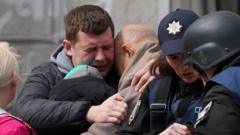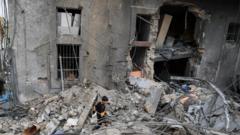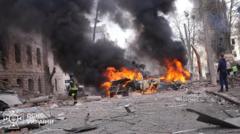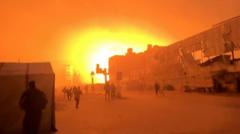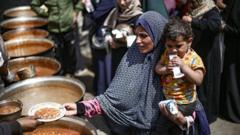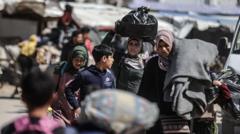With the blockade's severe impact on the humanitarian situation in Gaza, UN leaders emphasize the need for international intervention to ensure aid reaches those affected. They assert that conditions are dire, contradicting claims of adequate local resources, as hospitals and essential services struggle to cope.
UN Officials Urge Immediate Global Action to Assist Gaza’s Humanitarian Crisis
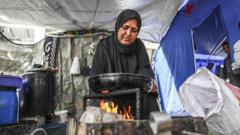
UN Officials Urge Immediate Global Action to Assist Gaza’s Humanitarian Crisis
Six UN agencies call on world leaders to facilitate urgent access to food and medical supplies amidst Israel's month-long blockade on Gaza.
The heads of six UN agencies have issued a compelling appeal to world leaders, demanding urgent action to ensure that vital food and medical supplies reach Palestinians in Gaza, who have faced a blockade by Israel for over a month. In a collaborative statement, the UN officials described the situation in Gaza as one where residents are "trapped, bombed, and starved," emphasizing that supplies are accumulating and inaccessible at crossing points. Israel has halted all deliveries, including humanitarian aid, since March 2, following the expiration of a ceasefire, with demands for Hamas to agree upon an extension. However, Hamas has rejected these conditions, accusing Israel of failing to fulfill its obligations.
Israeli officials claim that there is sufficient food in Gaza to last for an extended period; however, the UN agencies challenge this assertion. They describe a vastly different reality, with bakeries closed and markets devoid of fresh produce, leading to rationing of essential medications in hospitals. The statement from the UN agencies highlighted that the brief ceasefire allowed for some escape from the devastation of war, remarking that this period enabled life-saving supplies to reach the population—accomplishments hindered throughout almost 470 days of conflict.
The joint statement was signed by heads of various UN bodies, including the Office for the Coordination of Humanitarian Affairs (OCHA), UNICEF, the World Food Programme (WFP), and the World Health Organization (WHO). They declared that the health system in Gaza is collapsing under the pressure, stating, "Essential medical and trauma supplies are rapidly running out." The UN officials made a clarion call to global leaders to uphold international humanitarian laws by protecting civilians, facilitating aid delivery, releasing hostages, and restoring the ceasefire.
The ceasefire was a critical period that also led to the release of 33 hostages by Hamas, eight of whom were subsequently found dead, in exchange for approximately 1,900 Palestinian prisoners in Israeli custody. However, following this brief reprieve, Israeli military operations resumed with renewed aerial bombardments and ground offensives in Gaza on March 18. The ongoing conflict was ignited by a significant attack by Hamas on October 7, 2023, leading to over 1,200 Israeli casualties and the taking of hostages. As of now, more than 50,810 Palestinians have reportedly died since the start of the latest military offensive, according to data from Gaza’s Hamas-run health ministry.

